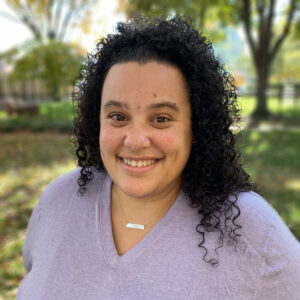
By Rachel Faulkner
It cannot be a mere coincidence that Martin Luther King Jr. was born just two weeks before we observed Tu Bishvat in 5689, on January 15, 1929. This year, we are observing both Tu Bishvat and Martin Luther King Jr.’s birthday on the same day. This confluence of celebrations is not a coincidence, and it feels exactly right in the part of my soul where my Blackness, Womanhood, Judaism, and Queerness intersect.
Have you ever paused when looking up at the beauty of a tree – at the fruit it bears, or at flowers in bloom – and thanked the roots? Try it. Notice how the intersecting, web-like roots that are typically invisible to us are actually what create the very parts that we experience, enjoy, and celebrate. How easily we sometimes forget that it is those very roots that have kept the tree alive through decades, generations, or maybe even centuries.
It is also the invisible work of Martin Luther King, Jr. that has kept me alive over the decades. We celebrate the visible, and assuredly beautiful, parts of Martin Luther King Jr.’s work, like the “I Have A Dream” speech, the Montgomery Bus Boycott, or the countless marches pictured in our history books and held in our hearts. But Martin Luther King, Jr. also did work that we don’t always notice, remember, or talk about, and that work is what sustains me as I move through the world: the pride in Blackness that he instilled in my father, a pride that my father passed down to me and that I hope to pass down to my daughter one day. It is the leaders that he nurtured through the Southern Christian Leadership Conference, where he served as the organization’s first president: John Lewis, Andy Young, Ella Baker, Ralph Abernathy, Bayard Rustin, and countless others. Many of them lived decades longer than King, continuing the legacy of shifting Black voice and leadership in the United States, making room at the table for my own voice and leadership.
My leadership is the fruit and the flowers in bloom, and Martin Luther King, Jr. and the rest of my ancestors are the invisible roots I sometimes forget to pause and thank. Sometimes I struggle in my leadership – I doubt myself, I make mistakes, I cause harm. These are all trials and tribulations that we know Martin Luther King Jr. experienced, too. I am not the only one who owes much of my own leadership to the roots of Martin Luther King, Jr; indeed, he laid the roots for many of our movements.
This year, as we honor both the trees and Martin Luther King, Jr. on the same day, it’s particularly important for those of us who lead in our Queerness, in our Blackness, in our Womanhood, in our Jewishness, and in many of our other marginalized identities, to take this opportunity to feel and express gratitude. It was Martin Luther King, Jr. who gave license to us all to shout from the rooftops that being white, male, straight, cis, and able-bodied is not a prerequisite to deserving respect and dignity.
I invite you to see more than a mere coincidence of timing this year. I invite you to see an opportunity: to recognize and honor the invisible work of the roots of the trees. Take a walk and see the trees on your street, glance down and admire their roots. Plant a new tree and say words of gratitude for the work its roots will do. Throughout your day, when you contemplate the legacy of Martin Luther King, Jr., honor the work he did that too often stays invisible. Notice how his work continues to support you, as a human, and in your work.
I hope that this year, you find yourself inspired to make the roots of our ancestors visible, to acknowledge and appreciate them. Just as each individual root relies on the next in order to successfully keep the tree alive, let us be reminded this year, and in all years, that each of us and all the individual movements we are a part of, rely on one another to successfully create a more just, equitable, and respectful world.

Rachel Faulkner (she/her) is a community organizer, a social justice advocate, and an anti-racist educator. She currently serves as the Director of Community Investments at the Safety Respect Equity Network, where she oversees grant-making, funder and partner relations, and research and learning. She has also held roles at City Year, Match Education, Community Builders, and Citizens of The World Elementary School. Rachel served as the National Organizer for #JWOCMarching, and is an alum of both Bend the Arc’s Selah program and the Schusterman Foundation’s REALITY trip. Currently, some of her most favorite work includes serving on the Board of Directors for T’ruah: The Rabbinic Call for Human Rights and the Jewish Multiracial Network. Ultimately, Rachel is passionate about ensuring that the voices of Jewish Women of Color are centered in Judaism and in the greater world, but when she’s not busy doing that, she spends time with her 1.5-year-old daughter Ori Justice taking walks around the nation’s capital or riding the “choo-choo train” to stops they’ve never discovered before.
We shared five reflections from queer Black Jews to honor the confluence of Tu Bishvat and Martin Luther King, Jr. Day in 2022. Click here to view the whole collection!